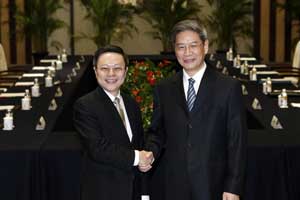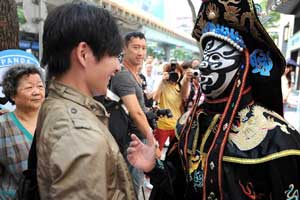Referring to the historic meeting, Wang said it "does not come easy — it is the result of interaction between the two sides for many years”.
Wang invited Zhang to visit Taiwan, and Zhang accepted.
Analysts said the meeting offers a new platform for interaction between the mainland and Taiwan, which are likely to gain experience for further consultations.
"The institutionalized communication mechanism creates plenty of room for the two sides to develop cross-Straits ties,” said Ruan Zongze, vice-president of the China Institute of International Studies.
"The development of cross-Straits ties has entered a critical stage because most of the easy problems have been tackled after years of efforts between the two sides and the remaining issues are all difficult ones,” Ruan said.
"With more interaction between the cross-Straits affairs agencies, hopefully the two sides will shift the focus from routine affairs to political issues,” he said.
"At some point, the two sides will have to move forward and start to tackle the once untouchable problems.”
Ni Yongjie, deputy director of the Shanghai Institute of Taiwan Studies and head of Cross-Taiwan Straits Studies magazine, said regular liaison between the two departments means diversified channels of communication.
"As the two-way interaction between the mainland and Taiwan has been increasing rapidly in areas such as tourism, economy and trade in recent years, new problems emerge as well,” Ni said.
"It is simply not enough for people across the Taiwan Straits to rely on the mainland’s Association for Relations Across the Taiwan Straits and Taiwan’s Straits Exchange Foundation to solve problems,” he said.
The choice of Nanjing as the meeting venue has special resonance, as it was the capital of the then-Kuomintang government. Nanjing is also the location for the tomb of Sun Yat-sen, a founder of the Kuomintang and pioneer of the Chinese democratic revolution respected by both sides.
Wang is leading a 20-strong delegation on a four-day trip to the mainland. On Wednesday, he will visit Sun’s mausoleum and deliver a speech at Nanjing University. He will end his trip in Shanghai.
"The visit (to the mausoleum) at least shows that Wang is in line with Sun’s political ideals. The action per se is an expression of Taipei’s stance,” Ruan added.
In 2005, then-KMT chairman Lien Chan’s ice-breaking trip started in Nanjing. In the same year, chairman of Taiwan’s People First Party James C. Y. Soong spoke in Nanjing dialect when giving a speech in the city.
A survey in January by Taiwan’s mainland affairs department showed that 60 percent of Taiwan people agreed that pragmatic exchanges between officials in charge of cross-Straits affairs are conducive to the healthy development of cross-Straits ties.
Contact the writers at [email protected]
 |
 |
| 'Unimaginable' cross-Straits meeting breeds optimism | Air travel to Taiwan continues to take off |
